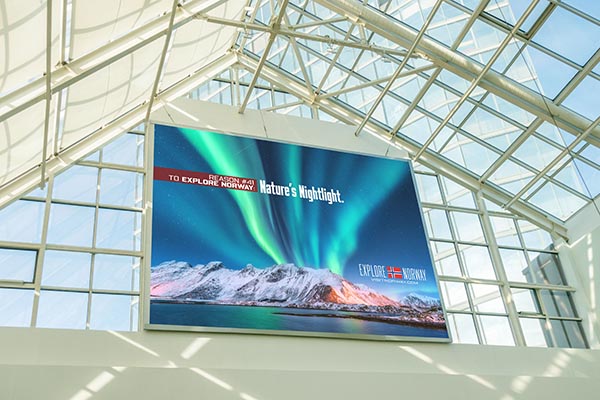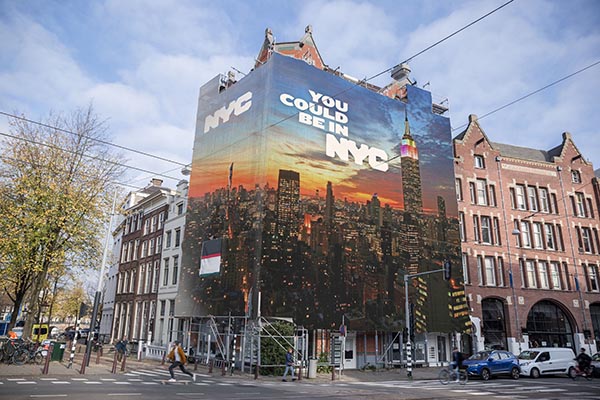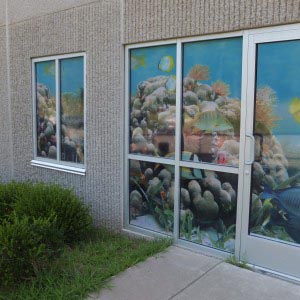This article is sponsored by Ultraflex, makers of the EcoVantage line of substrates for display graphics, as part of WhatTheyThink’s Product Spotlight series. In preparing this article, the WhatTheyThink Print Wide Format Section editors conducted original, in-depth research on the company and product. Ultraflex reviewed the final article for accuracy but had no editorial control over the content.
Over the past few years, as sustainability has become a more important consideration in display graphics printing, there has been something of a backlash against vinyl substrates, particularly those made using polyvinyl chloride (PVC). This has been a big driver of so-called “soft signage,” especially in Europe, but has also spurred consumables manufacturers to develop alternative films using polymers based on natural resins that don’t have all the additives that PVC has. At the same time, these materials must have the same printability features as vinyl, perform well with eco-friendly and even recycled ink, and be versatile enough to help print providers expand the range of products they can offer without having to warehouse a ton of different SKUs. Those are a lot of boxes to tick, but one product line that hits them all is Ultraflex’s EcoVantage.
Launched in 2021, EcoVantage comprises 100% PVC-free and phthalate-free films for outdoor advertising, POS, wall coverings, and retail displays. In 2022, in response to demand from customers looking for a greater variety of PVC-free materials, Ultraflex expanded the EcoVantage line to a total of nine products, offering solutions for display graphics providers looking for substrates that are frontlit, backlit, blockout, mesh, indoor, outdoor, wallcoverings—you name it.
The specific products in the EcoVantage line include:
EcoVantage DSS Blockout—A durable material designed for a wide range of indoor applications such as banners, banner stands, and point-of-sale materials. This substrate can be duplexed and offers opacity to prevent translucency (i.e., showthrough).
EcoVantage Greyback—As the name indicates, this material features a gray back that prevents translucency, and is designed for pop-up displays, banner stands, x-frame displays, or indoor and outdoor applications that require complete opacity.

EcoVantage Greyback
EcoVantage Pole Banner—A heavy-duty material designed for outdoor applications that provides additional strength and stability under adverse weather conditions. It has a coated, double-sided print surface and complete opacity to prevent translucency.
EcoVantage Supreme—A waterproof material designed for a wide range of outdoor applications including banners, outdoor signage, and point-of-sale. This material features high opacity and is capable of being welded or sewn for hemming or to create pole pockets.
Ultima EcoVantage—A lightweight material designed for outdoor advertising, point-of-sale, wall coverings, and retail displays. It can be high-welded and sewn and offers a high tear-resistance and tensile strength.
UltraMesh EcoVantage—A mesh material designed for a wide range of indoor and outdoor applications such building wraps, fences, barricades, and stadium graphics.

UltraMesh EcoVantage
Wallscapes EcoVantage—A flexible wallcovering material with a non-woven backing. It can be installed using commercial grade adhesives, sewing, or grommets. It is available in Smooth and Pebble finish.
EcoVantage substrates are compatible with solvent, eco-solvent, UV, latex, and screen printing. These materials can be recycled (EcoVantage 190 is recyclable under PET code #1) or incinerated without releasing toxins. (Be sure to check with Ultraflex or your supplier about the recyclability requirements of specific materials.)
Ease of Installation…and Removal
In addition to sustainability, ease of installation has become of increasing importance to display graphics producers because more and more often installation will not be performed by professional installers but by managers or other employees at retail locations, convenience store clerks, office managers, or others who may not have a great deal of—or indeed any—experience installing graphics. So window, wall, or other graphics that can be easily repositioned before “securing” to the surface make them easier to install.
At the same time, a lot of display graphics are temporary, which means they need to be removed as easily as they were installed—and without damaging the surface to which they were applied.
Mass Customization
 Another trend the folks at Ultraflex has been tracking and optimizing their substrates is a greater degree of customization and personalization of graphic elements—especially in the area of environmental/experiential graphics. (Experiential graphics can best be thought of as the intersection of signage and décor—check out a handful of previous articles here, here, and here.) Experiential graphics was a hot application pre-pandemic, and as work-from-home has become more prevalent—and looks like it will be for some time—people are taking the opportunity to customize and personalize their workspaces. This means that wallcoverings have become popular, leading to the need for more patterns and textures as well as complementary flooring elements, such as an area rugs, thanks to an interest in personalizing the design.
Another trend the folks at Ultraflex has been tracking and optimizing their substrates is a greater degree of customization and personalization of graphic elements—especially in the area of environmental/experiential graphics. (Experiential graphics can best be thought of as the intersection of signage and décor—check out a handful of previous articles here, here, and here.) Experiential graphics was a hot application pre-pandemic, and as work-from-home has become more prevalent—and looks like it will be for some time—people are taking the opportunity to customize and personalize their workspaces. This means that wallcoverings have become popular, leading to the need for more patterns and textures as well as complementary flooring elements, such as an area rugs, thanks to an interest in personalizing the design.
In addition to the EcoVantage, Ultraflex offers myriad other display graphics substrates for virtually any application. The company also recently launched a new window perforated film called UltraVision Micro-Perf 60/40 featuring hole diameters of 1mm, which creates closer spacing and a visually uniform graphic.
At the End of the Day
As a display graphics provider, your prime directive is to pick the material that is most appropriate—in terms of print quality and durability—for the specific applications you are producing for your customers. When they can also offer a sustainable solution as well as other advantages such as ease of installation, it’s an even better value proposition.














